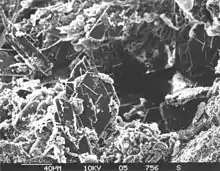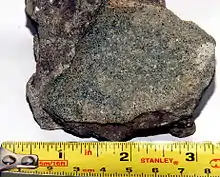Authigenesis
Authigenesis is the process whereby a mineral or sedimentary rock deposit is generated where it is found or observed. Such deposits are described as authigenic. Authigenic sedimentary minerals form during sedimentation by precipitation or recrystallization[1] instead of being transported from elsewhere (allogenic) by water or wind.[2] Authigenic sediments are the main constituents of deep sea sedimentation. Authigenic clays tend to reduce the porosity of sediments, thus reducing permeability.

In metamorphic petrology an authigenic mineral is one formed in situ during metamorphism, again by precipitation from fluids or recrystallization.
For any mineral to be precipitated, the water must be oversaturated with respect to that mineral. For calcite, this means that the area of deposition must be above the carbonate compensation depth, or that the pore waters are sufficiently saturated due to dissolution of other grains that precipitation can begin. The alkalinity can also be reduced by microbial sulphate reduction.[3]
Common authigenic minerals in sedimentary rocks

See also
References
- Authigenic from Oilfield Glossary
- Allogenic from Oilfield Glossary
- SCOTT RITGER, BOBB CARSON and ERWIN SUESS, 1987. Methane-derived authigenic carbonates formed by subduction-induced pore-water expulsion along the Oregon/Washington margin. Geol. Soc.Am. Bull.; 98; 147-156
- SCOTT RITGER, BOBB CARSON and ERWIN SUESS, 1987. Methane-derived authigenic carbonates formed by subduction-induced pore-water expulsion along the Oregon/Washington margin. Geol. Soc.Am. Bull.; 98; 147-156
- Kathleen C. Ruttenberg and Robert A. Berner, 1993. Authigenic apatite formation and burial in sediments from non-upwelling, continental margin environments. Geochim. Cosmochim. Acta.; 57; 991-1007
- M. D. Wilson and E. D. Pittman, 1977. Authigenic clays in sandstones; recognition and influence on reservoir properties and paleoenvironmental analysis. J. Sed. Res.; 47; 3-31.
- Collinson, J.D. and Thompson, D.B. (1982). Sedimentary Structures. London: George Allen & Unwin. p. 151. ISBN 0-04-552018-6.CS1 maint: multiple names: authors list (link)